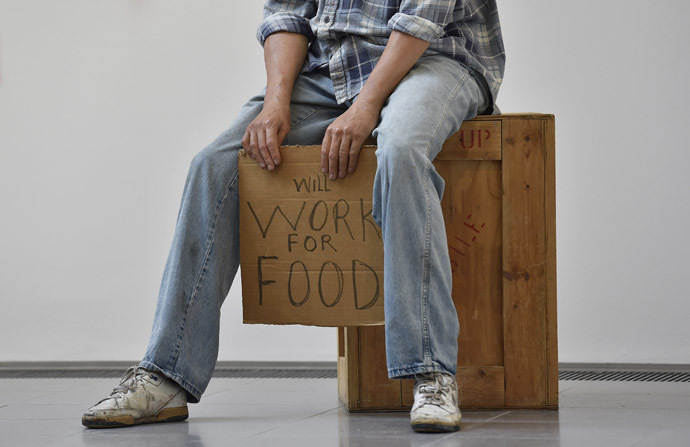'Epidemic of food riots' could trigger society collapse by 2040, warn scientists

With the global demand for food on the rise, our society could collapse as soon as in 2040 due to fatal food shortages and "unprecedented epidemic of food riots," if counter measures are not taken, researchers have warned.
Food security experts and analysts in the field of the economics
of sustainable development were asked to develop the worse-case
scenario illustrating a "plausible, relatively-severe
production shock affecting multiple agricultural commodities and
regions."
According to a report from Lloyds of London prepared with the
help of Anglia Ruskin University’s Global Sustainability
Institute, "the global food system is under chronic pressure
to meet an ever-rising demand, and its vulnerability to acute
disruptions is compounded by factors such as climate change,
water stress, ongoing globalization and heightening political
instability."
Researchers say that the food system is becoming “increasingly vulnerable to acute shocks,” driven by the world’s population growth and shifts in consumption patterns as countries develop. The UN's Food and Agriculture Organization (FAO) projects that global agricultural production will need to more than double by 2050 to close the gap between food supply and demand, the report, supported by UK's Foreign Office says.

"A shock to the global food supply could trigger significant
claims across multiple classes of insurance, including (but not
limited to) terrorism and political violence, political risk,
business interruption, marine and aviation, agriculture,
environmental liability, and product liability and recall,"
the report warns, adding that these losses could be aggravated by
the potential for a food system shock to last for years to come.
The Director of the Global Sustainability Institute, Dr. Aled
Jones, told Insurge Intelligence that "based on
plausible climate trends, and a total failure to change course,
the global food supply system would face catastrophic losses, and
an unprecedented epidemic of food riots."
"We ran the model forward to the year 2040, along a
business-as-usual trajectory based on ‘do-nothing’ trends — that
is, without any feedback loops that would change the underlying
trend," he said.
"In this scenario, global society essentially collapses as
food production falls permanently short of consumption,"
Jones added.
READ MORE: Children forced to live on £1 a day ‘ultimate losers’ of welfare reforms – study
According to new research, thousands of children in the UK are
being pushed into severe poverty and hunger because their parents
cannot work or receive government benefits. Researchers from the
Centre on Migration, Policy and Society at the University of
Oxford say children appear to be the “ultimate losers,” with
thousands subsisting on as little as £1 (US$1.57) per person per
day.
Families across the UK are being forced to cut spending on
essential items such as food, clothing and heating as a result of
government cuts to child benefits, with low-earners among the hardest hit, as always. The
number of British people relying on food banks is soon expected
to reach one million, according to the Trussell Trust.
READ MORE: NY food banks seek $16 million in state funding to restock their barren shelves
In New York, about 2.6 million people have trouble affording
food, and must make a life-threatening choice between eating and
paying for other necessities like rent, medication, child care or
transportation, according to the Food Bank For New York City.
Some 17 million elderly Americans are in need of
government-funded meal services, but according to a new report by
the Government Accountability Office, 90 percent of them don't
receive it. About 83 percent of those adults in need are food insecure.
Meanwhile, according to the UN, one-third of food globally (1.3
billion tons each year) is spoiled or wasted before it is
consumed by people, causing losses of $750 billion, as well as
significant damage to the environment.
Last month the French government took measures to minimize food
waste, banning large supermarkets from destroying unsold
products. From now on they will be forced to donate unsold, but
still edible goods to charities or farms. Food that is past a
firm expiration date would go to farms to be used as animal feed
or compost. The new law, along with an education program about
food waste introduced in schools and businesses, is part of an
effort by Paris to halve the amount of food waste in France by
2025.












